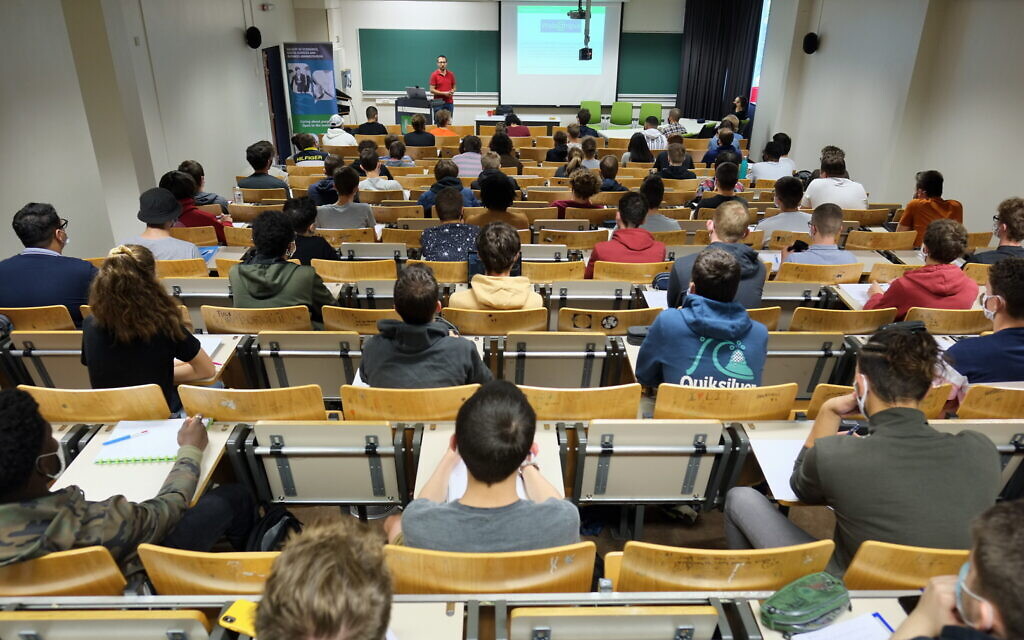Freshers’ week upended by strict rules and awkward Zoom socials
Freyde Sayers speaks to students about their experiences of university under the impact of Covid-19
Settling into the first year of university always has its challenges but this autumn’s intake of freshers have had the whole experience upended thanks to the coronavirus.
One of the institutions with scores of cases and hundreds of students self-isolating is Abertay University, in Dundee. Jakob Dalland, a first-year Jewish student at Abertay, feels lucky not to be locked down and has made a friend in his accommodation block but knows the experience is not what it would have been. Jakob, who comes from Edinburgh, said: “I’ve got less chance to meet other people because you can’t socialise.”
As for joining societies, he said Zoom meetings feel awkward and found them a turn-off. “It’s a lot different to seeing someone in person. You can’t read someone’s body language.”
Get The Jewish News Daily Edition by email and never miss our top stories Free Sign Up
Emily Cohen, a first-year psychology student at Leeds University, had to start isolating 10 days after arriving. “It’s not ideal because you want to meet as many people as possible at the beginning,” she said.

Her first few days at the university felt quite normal. “Although we couldn’t go to clubs, people were still socialising and it was fun,” she said. But now Covid is going around her accommodation.
“I was kind of expecting it. My friends and I have already interacted with hundreds of people, so it wasn’t surprising the virus was spreading. It’s so hard, but so many of my friends at different unis are in the same position. It’s just what we’ve got to deal with. I’m happy that I like my flatmates. If you don’t it’s even harder.”
It’s so hard, but so many of my friends at different unis are in the same position. It’s just what we’ve got to deal with. I’m happy that I like my flatmates. If you don’t it’s even harder.”
Tobias Cohen, 21, president of Cambridge University Israel Society and in his final year of a degree in human, social and political sciences, would normally be organising in-person events to recruit freshers but is having to rely on virtual gatherings. “A large part of the way we work is that people meet each other and make new friends and hang out and you build relationships with people. That element won’t be there.’

Likewise at Durham University JSoC, in-person events have been turned into virtual ones. Miriam Makin, the society president and a final-year psychology student, said uni life this term was “very different from normal”. Every week JSoc would hold a buffet-style dinner, which they hoped to keep going in some form. “Alternatives are being worked on,” she said.
Mia Shindler, a final year history student and the JSoC’s head of outreach, is hoping they can come up with “creative ways of running online events”. There is the question of how comfortable some students are with using technology on Shabbat and the High Holy Days. “For Rosh Hashanah and Yom Kippur we had Zoom events and the people who didn’t want to join during the day caught up afterwards.”
William Craig, an economics student at Durham, is not enjoying being a Covid fresher. “It’s very strict, with wardens coming around to make sure you don’t mix households or anything.” He said the university was running in-person events for freshers – such as silent discos – to keep boredom at bay, but it didn’t feel like normal university experience. “Online lectures are horrible,” he added.
It’s very strict, with wardens coming around to make sure you don’t mix households or anything.
Of course some students decided – or were forced – to defer their places and are on gap years. Angelica Levy, 18, from north-west London, is in Jerusalem on the Aardvark Israel programme. “We’re in a lockdown but it’s not that bad,” she said. “Yom Kippur in Israel is so cool. My friend went for a run on the motorway.”
What is clear is that although there is a degree of normality at many universities, Zoom is looming larger in freshers’ lives than they would wish.

Thank you for helping to make Jewish News the leading source of news and opinion for the UK Jewish community. Today we're asking for your invaluable help to continue putting our community first in everything we do.
For as little as £5 a month you can help sustain the vital work we do in celebrating and standing up for Jewish life in Britain.
Jewish News holds our community together and keeps us connected. Like a synagogue, it’s where people turn to feel part of something bigger. It also proudly shows the rest of Britain the vibrancy and rich culture of modern Jewish life.
You can make a quick and easy one-off or monthly contribution of £5, £10, £20 or any other sum you’re comfortable with.
100% of your donation will help us continue celebrating our community, in all its dynamic diversity...
Engaging
Being a community platform means so much more than producing a newspaper and website. One of our proudest roles is media partnering with our invaluable charities to amplify the outstanding work they do to help us all.
Celebrating
There’s no shortage of oys in the world but Jewish News takes every opportunity to celebrate the joys too, through projects like Night of Heroes, 40 Under 40 and other compelling countdowns that make the community kvell with pride.
Pioneering
In the first collaboration between media outlets from different faiths, Jewish News worked with British Muslim TV and Church Times to produce a list of young activists leading the way on interfaith understanding.
Campaigning
Royal Mail issued a stamp honouring Holocaust hero Sir Nicholas Winton after a Jewish News campaign attracted more than 100,000 backers. Jewish Newsalso produces special editions of the paper highlighting pressing issues including mental health and Holocaust remembrance.
Easy access
In an age when news is readily accessible, Jewish News provides high-quality content free online and offline, removing any financial barriers to connecting people.
Voice of our community to wider society
The Jewish News team regularly appears on TV, radio and on the pages of the national press to comment on stories about the Jewish community. Easy access to the paper on the streets of London also means Jewish News provides an invaluable window into the community for the country at large.
We hope you agree all this is worth preserving.
-
By Brigit Grant
-
By Laurent Vaughan - Senior Associate (Bishop & Sewell Solicitors)
-
By Laurent Vaughan - Senior Associate (Bishop & Sewell Solicitors)
-
By Laurent Vaughan - Senior Associate (Bishop & Sewell Solicitors)
-
By Laurent Vaughan - Senior Associate (Bishop & Sewell Solicitors)






















